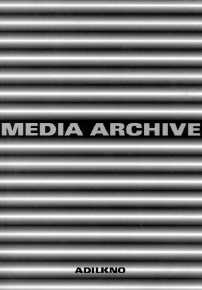Media Archive
Charlie Gere on ADILKNO and its latest publication Media Archive(Autonomedia $14)
 ADILKNO, an English rendering of the Dutch acronym BILWET, denotes the 'Stichting ter Bevordering van de Illegale Wetenschap', or 'Foundation for the Advancement of Illegal Knowledge', a group of 'non-academic theorists' who came together out of the Dutch squatter and autonomous movements of the early 1980s. Members include Geert Lovink, Basjan van Stam, Arjen Mulder, Lex Wouterloot and Pit Schultz. Since their inception they have been increasingly concerned with writing about the media and the media text, which, as Lovink proclaimed in a paper given at ISEA 94 "describes no reality or ideas outside the text. Its material is the media itself - not the equipment or programs, but their possibilities."
ADILKNO, an English rendering of the Dutch acronym BILWET, denotes the 'Stichting ter Bevordering van de Illegale Wetenschap', or 'Foundation for the Advancement of Illegal Knowledge', a group of 'non-academic theorists' who came together out of the Dutch squatter and autonomous movements of the early 1980s. Members include Geert Lovink, Basjan van Stam, Arjen Mulder, Lex Wouterloot and Pit Schultz. Since their inception they have been increasingly concerned with writing about the media and the media text, which, as Lovink proclaimed in a paper given at ISEA 94 "describes no reality or ideas outside the text. Its material is the media itself - not the equipment or programs, but their possibilities."
Media Archive consists of fifty-one short polemical essays, many of which were originally published in the excellent Dutch and Belgian media journals Mediamatic and Andere Sinema. The first section, 'Media Only', outlines different kinds of media, as defined by ADILKNO: there's 'Normal Media', 'Old Media', 'Incorrect Media' and 'Vague Media'. The last, my favourite of ADILKNO's media definitions, are "impossible to follow... nothing is concealed or intentionally distorted. One simply does not know exactly, and this message comes through." According to ADILKNO, "certain historical figures have found their natural habitat in vague media: Mao, Gysin, Manson, Reich, Jesus, Debord, Meinhof, Fromm, Hitler, Hendrix, Castanade, Goldman, Marley, Pippi Longstocking." Passages like this, which abound in the book, give the flavour of its mixture of witty satire and opaque theory.
Other essays deal with media theorists such as Jean Baudrillard, Klaus Theleweit and Marshall MacLuhan, or aspects of mediate life such as surveillance, pop music, cinema, video, drugs, billboards and other forms of signage. New allegorical types are invoked and described, such as the 'Data Dandy', a kind of Benjaminian cyber-flaneur. All this combines to present a view of the world in which, as Geert Lovink proclaimed at ISEA, everything is media. Given such a view it is not surprising that ADILKNO should be interested in the work of Jean Baudrillard. Like Baudrillard's writing, these little essays can also be infuriating, incomprehensible, relentless, funny and perceptive - sometimes all at the same time. I am not sure whether this book is essential, or even necessary, but it would make a nice birthday present for your favourite media activist.
Charlie GereXc.gere AT hart.bbk.ac.ukX
Mute Books Orders
For Mute Books distribution contact Anagram Books
contact@anagrambooks.com
For online purchases visit anagrambooks.com







